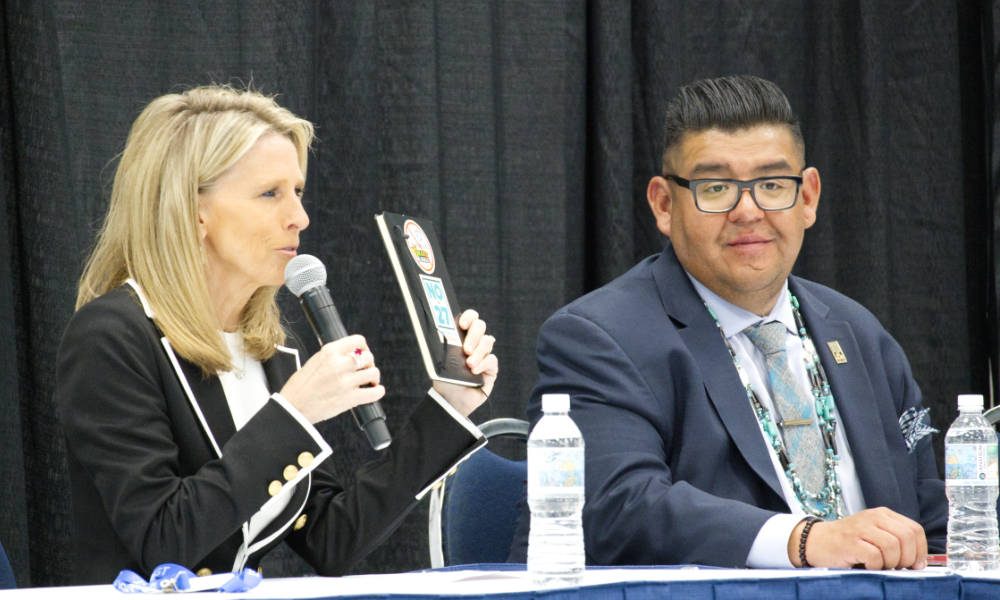Give FanDuel CEO Amy Howe credit. At the Indian Gaming Association Tradeshow & Conference in Anaheim Tuesday, Howe wasn’t reluctant to admit that not being able to pass the 2022 sports-betting initiative, Proposition 27, in California was a “spectacular fail.”
Then she brought out a prop: a card with “No on (Proposition) 27, a bad deal for California,” with a huge X crossing out FanDuel and DraftKings.
“At the end of the day, if wagering is going to be done legally in California, it’s going to be done with and through the 100-plus tribes there,” Howe said during the session “Balancing Act: Tribal Sovereignty in the New Frontier of Sports Wagering.” “For a quarter of a century, the tribes have done a phenomenal job of stewarding the Class III gaming licenses. So obviously for us, it was a big learning experience. It’s critical for us to do this together and not against one another.”
According to session moderator Jacob Mejia, Pechanga Development Corporation director of public affairs, Howe was the first CEO from a major operator to appear at a tribal event since the proposition failed to pass.
Noting that tribes often host forums for political candidates that are fundamental to tribal leaders and nations, Mejia said that it’s important for operators interested in doing business in California to be available.
“While you may not be running for office, your company was definitely on the ballot in 2022,” Mejia said, “and depending upon how this rolls out going forward, you may be on the ballot again. At a minimum, the industry that you represent will be on the ballot again at some point in time in the future.”
Essential when the issue of California sports betting is resurrected – at the earliest in 2026, according to Mejia – is recognizing that the tribes will be in control. Morongo Band of Mission Indians Vice Chairman James Siva noted that the tribes have built gaming into a $40 billion industry. If sports betting comes to California, it’s not going to be without tribal approval.
“It’s about defending and protecting everything we’ve built,” Siva said. “The expansion of gaming is going to happen. It’s a matter of when, not where. But when that does happen, tribes will remain in control in California. We’ll partner with companies, we’ll utilize their products, but again, tribes are the operators in California.”
“We can be an important partner and ally in helping tribes navigate (sports betting),” Howe said when asked about tribal sovereignty. “We also fully understand that that’s going to take some time. Today is another step, hopefully, in that direction.”
Howe also said there’s a perception that FanDuel is solely “economically motivated in its business engagements.” But she insisted that the company realizes its partnerships depend on the recognition that it’s dealing with human beings and in the case of California tribes, a unique culture.
“California can and should be the greatest market in the world for sports betting,” Howe said. “As I reflect on where this could go, I can give you lots of numbers and how big the market could be, but that’s not really all of it. In the context of California specifically, I think the future will be something that we’re going to shape together. But it’s going to have to work for all the tribes. One of the things we’ve got to figure out is what does that approach look like, how is that going to work? We know full well that it’s going to be different in California than any other market. I think that was the single biggest learning curve, that the terrain is very different here.”
Siva said it’s incumbent for operators to learn from prior mistakes. Patience is necessary, as is the ability to “listen, listen, listen.”
“We know where we want to go,” Siva said. “We’ve seen efforts in the past come in and divide and conquer tribes that weren’t successful. We’ve learned those lessons and we’ll make new relationships moving forward. We don’t forget, we remember, and that’s not going to work again. So I would say get out of our way. We know what we’re doing. This is our industry.”

